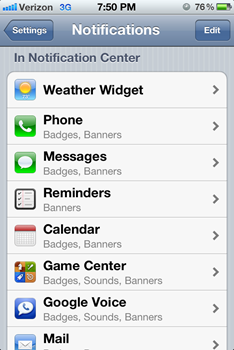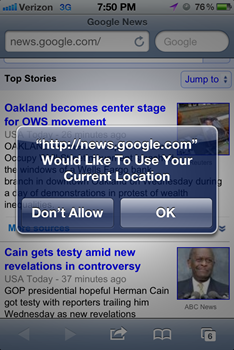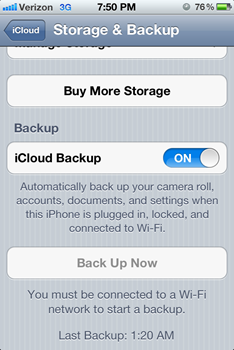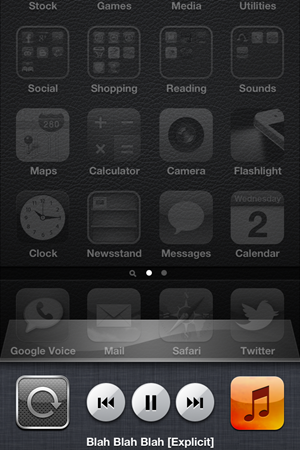iPhone, from a Former Android Enthusiast
I’ve never been a Mac or PC guy. I love technology too much to pick just one flavor. In college I ran Linux exclusively for a few years, now I use Windows almost exclusively, and my wife has a MacBook at home which I use occasionally. The best tool for the job, as they say.
My position on smart phones is much the same.
I used a horrible, nightmarish WinMo6 phone for a while. I hated that phone, but my company provided it and it did let me reach the internet from anywhere so I ought not complain too much. Eventually I realized that for $50 per month I could hop on to my wife’s plan and get whatever phone I wanted. I got a very delightful HTC Droid Incredible and loved it.
There’s a lesson here, folks: if you can afford to cure pain points, do it. For me, it was an embarrassingly easy decision once I realized how silly the whole thing was.
My DINC, as the cool kids call the Droid Incredible, was good to me. I bought it in July 2010. At the time I surmised that the Android/iPhone battle was in full force. I felt that Apple had an advantage (superior hardware and better apps) but that Android would overtake Apple by iterating more quickly. I’m not so sure about that now, but that’s not the point of this post.
I considered going with an iPhone 4 but at the time it wasn’t available on Verizon and lacked some features I really wanted (e.g. sane notifications and Google Voice integration). It was also not officially permitted by my company yet. Also, I’m a tinkerer and love the openness of the Android system and the community around it.
Here we are, 15 months later and now I have an iPhone 4S. A lot of people who know my history with WinMo, Android, and now iPhone have asked about my thoughts on the matter. Here they come in two acts:
- What I love about the iPhone as a former Android user (this post)
- What I miss from my Android as a new iPhone user and final conclusions (next post)
Let’s go.
What I love about the iPhone as a former Android user
App quality
I have many of the same apps on my iPhone that I previously enjoyed on my Droid. In many cases, however, the iPhone versions are better. Apps like Angry Birds and Words with Friends feel more mature. Their navigation is more intuitive and they don’t crash regularly.
Apps which stream media (e.g. NPR and YouTube) are much better.
Push notifications

iPhone is miles ahead when it comes to push notifications. The idea behind push is that you don’t want an app polling for updates because polling is slower and takes up power and system resources. Whatever Android is doing must be broken because hardly any apps support it there. On iPhone, though, everything does. It just works and it’s awesome.
They even give you a centralized location for managing what apps can notify you and what those notifications look like. For example, you can choose to have popups for texts, banners for emails, and nothing for individual games.
This all plays in nicely with the new Notification Center. That’s a feature that Android has had forever, and was one of the reasons I waited until iOS5 to try out iPhone.
App permissions

The way Android does app permissions is a little broken. When you go to install an app, you blindly acknowledge the stuff an app can do (you can’t deny certain permissions—if the app asks for it, you have to grant it to install the app).
iPhone seems to be a little different. There’s no permissions screen when installing apps (presumably apps are relatively safe…?) but if an app needs to do something extra concerning, like check your location, it has to ask you when it wants to do it.
This is better for two reasons. First, I am barely qualified to meaningfully review a list of cryptic permissions when installing an app. I don’t know what most of them mean and I won’t remember what I granted ten seconds (or ten months) later when using the app. Second, I don’t really care. The only thing that I actually do care about is location, and isn’t the best time to ask if you can use my location when you need it? At least then the app can make a case for it and you can actually say “no”.
User interface
Stock Android is fine, and some vendors extend it with their own special sauce, but there are some things that iPhone does better. First off, it’s much more responsive. Tapping around is met with prompt feedback. Animations are beautifully smooth (though I wish I could disable them).
Although I do miss my “back” button, I am adjusting to the fact that apps don’t have access to any buttons. This has one significant benefit in that the UI is so far more discoverable. That is, nothing is hidden behind the back/menu/search buttons that Android has.
In general, things are more polished which makes for a nice, clean experience.
One of the things Android has that iPhone lacks is home screen customizations, including widgets. But, I don’t miss those at all; iPhone is right to forbid them. The less time I waste managing the home screen (which is insanity on Android), the better.
Content management (iTunes)
I know this isn’t a popular position, but I like iTunes. I’ve used it since version 3. I like having a single desktop app that syncs everything up for me. On Android you’re on your own. There are lots of individual apps that help you connect to cloud services (Google Music, Amazon MP3), but managing your own media—files you have in hand—is tricky with Android. On iPhone, it just works.
Backups/iCloud

I love that iPhone does daily backups automatically, without a computer. Every night when I plug my phone in the for the night, it backs itself up to Apple. Incidentally, I had an issue with a corrupt picture breaking all kinds of things and had the chance to test the restore process. It works great.
While sitting on the couch watching TV I was able to restore from the previous day’s backup. Theoretically, I lost only the last 24 hours or so of content. In practice, however, I didn’t really lose anything because things like pictures, contacts, etc. are backed up to iCloud often within minutes of being created or changed.
A lot of your content is automatically backed up on Android, too, but the process doesn’t seem to be as comprehensive or give you much confidence it will work.
Camera
The camera on this thing is amazing. I don’t know what resolution it is—megapixels are inconsequential these days. It shoots in low light, takes crisp pictures, and has just the right tools for editing on board (cropping, namely). Oh, and it’s very fast. I particularly like that you can go straight to the camera from the lock screen (double-tap the home button) to capture fleeting moments (I had this on my droid, too).
Video/FaceTime
The video camera is great, too. It’s fast and easy to use, and supports trimming right on the phone. This means I can take a five minute video of my kids, but only share the 12 seconds that are actually cute.
As a traveler, I love the built-in FaceTime support, too. Previously, I would call my family using my laptop and Skype or Google Talk. That worked ok, but there really is something great about being on a call with Wife and simply hitting the FaceTime button so I can see her and the kids face-to-face.
Battery life
I’m extremely happy with the iPhone’s battery as compared to my Droid. My Droid could go a whole day if I didn’t use it much, and was a power miser. On my iPhone, I use it all time time, never think about power, and always have plenty of juice left at bedtime.
Another nice thing is charging time. This things charges crazy fast.
Dock connector
My previous phones have depended on various forms of USB. I love that Droids and other gadgets are standardizing on micro-USB—that’s great—but I also like what I get with the dock connector. It’s a solid connection that doesn’t wiggle and provides clean, line-out audio in my car (something I never got working well with my previous phones).
Exchange Support
Apple has a head start over Android on decent Exchange support and it shows. My Droid would struggle to bring in new emails, would never process appointments correctly, and would often hold outgoing mail in the outbox for days or weeks.
It’s all smooth sailing on iPhone. I confidently use email and calendaring like never before.
Music Controls Support
Some apps worked well with the lock screen music controls on my Droid but others didn’t. So far it’s been a very pleasant experience on iPhone. The lock screen controls (left image) and the app-switcher pane controls (right image) are intuitive and consistent.

Native screenshot support
I have often complained that Android provides no built-in support for taking screenshots. In the past two weeks, I’ve taken several on my iPhone. It’s easy, convenient, and useful. (It certainly made writing this post easier!)
Safari
This one isn’t really props to Apple or Safari directly. Instead, it seems that more sites have been tested against iOS than against Android. For example, most sites that have video seem to work great on iPhone. My Droid however, would often choke on sites that relied on Flash to deliver video or other non HTML content. If the Flash player embedded in the site wasn’t mobile friendly (many are not), the experience of trying to use a tiny video play that’s not designed to be used from a touch interface was not much fun.
I don’t know how people are doing it better on iPhone, but they do.
I’m sure I’ll think of many more as soon as I post this…
Now before you brush me off as a shameless, converted fan boy, check back for the next post wherein I detail the things I miss from my Droid and cry about the fact that I’ll never get them in the mean, closed world of iPhone.
